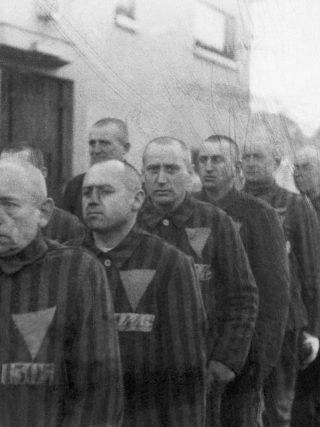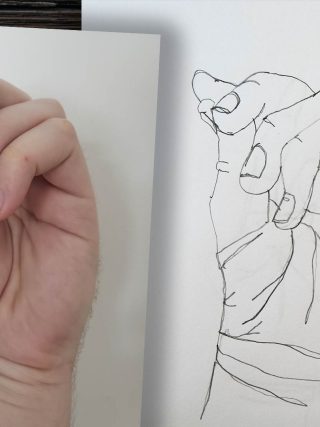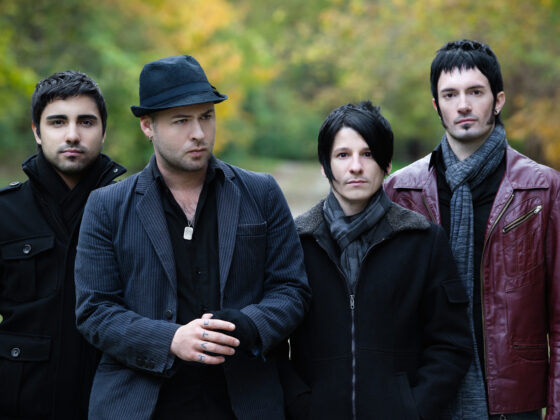This interview was originally conducted in early October 2012 and published in the November-December 2012 issue of SFL Onstage and has been republished with permission.
Every band evolves at some point. The difference is that for Hoobastank, they are a constantly changing band that is never afraid to push the limits of what they will try. With Fight or Flight, the band moved on from Howard Benson as producer, and opted for someone else to shake up its foundation with Gavin Brown.
Starting out with a horn section, Hoobastank was mistakenly labeled “ska” in the late nineties. With the departure of Markku Lappalainen on bass, the band has had a rotating line-up of musicians for years until they settled on Jesse Charland. On Fight or Flight, there is a distinct difference in their guitar tones and song structures. “Magnolia,” written about vocalist Doug Robb’s daughter, even features an ultrasound recording of her prenatal heartbeat. Given enough time, any band will grow. Hoobastank is no different. SFL Onstage sat down with Doug to discuss the recording of the new album.
First of all, after reading so many interviews with you guys, they all start to feel the same, so I want to open it up before I start firing away rapid generic questions. Is there anything about this album that you really want to talk about that’s important to you.
I feel like that’s a semi-generic question masked as a non-generic question. [Laughs] I don’t know. There’s a lot of little details musically that are kind of interesting, but besides the fact that it’s the first album since The Reason that we’ve gotten to write and record as a full four-piece band, I think that’s kind of important, you know? Like, we had a couple records where we kind of pieced together songs and did it in a different fashion, so this kind of feels more comfortable and feels like how it should be.
I know that since the beginning, you guys have been a pretty tight-knit group, with the exception of having a few different bassists. How did the addition of Jesse on bass change the dynamic of the band?
Well, honestly, I think for the first time, maybe ever, we’re a four-piece band who actually gets along. I can only compare it to when Markku, our original bass player, was in the band. We all did get along, but I don’t think our communication was great. There’s a difference between getting along kind of superficially and getting along in a very deep way.
I think, at this point, like the four of us… I don’t know. We’re really close. Obviously, the three original members are really close to each other. But at this point, we know each other so much better than we did even in 2000. And with Jesse, he kind of fit in so seamlessly, and credit to him for being so laid back about everything. As a band, I feel we’re probably in the healthiest place we’ve ever been.
I don’t think a lot of fans know, but you started out as a ska band. How did that work out?
I mean… the reason why fans probably don’t know is because we never really saw ourselves as a ska band. I think that’s probably the first and foremost reason. I, personally, was never like a ska fan. I don’t think anyone ever really was in the band. I think bands like Fishbone–where Dan was a huge Fishbone fan, still is… bands like Mr. Bungle, which we all were big fans of, I think, had elements of ska, but they also had elements of metal and other things.
We were never a straight-forward ska band. There were definitely some riffs for sure, even songs that had a lot of ska influence in it. I even remember back in the nineties… like mid-to-late nineties when we were playing shows out in Hollywood and stuff like that, we’d get asked to play these festivals shows that are crunked in with all these ska bands. We’d play and a couple songs would go really well, and the rest people would just be like, “Dude, what are these guys doing here? They’re not a ska band.” You know? So that’s probably why people won’t go, “Oh, they were a ska band at first.” I don’t know, maybe we got tired of getting lumped in with that because it was only a small aspect of what we were musically. And then, that’s how we just kind of maybe purged ourselves of that influence and all.
Fight or Flight really shows the maturity of the band since I first started following Hoobastank. So how do you pick topics to write lyrics about, specifically on this album?
It really depends. The easiest answer is just personal experience and things that are going on in your life. There have been a lot of things that had happened in-between records, as there always is. Like my wife and I had a daughter, and we jumped off Island Records as a label. We switched management. There are a lot of things that can inspire certain topics.
You know, other guys in the band had experienced things too. But then again, a lot of times in the song itself, you’ll hear the musical idea for it and it will dictate exactly where you’re going lyrically. Some songs just sound like they need to be about certain topics. But I’m not one of those guys that have a lot of lyrics that don’t have songs to them yet. I feel like some people just have notebooks and notebooks of thoughts. I have some, but definitely not as much as one would probably think. I kind of write as the music comes to me; when it gets to me, I start writing.
Since you parted ways with Island Records and Producer Howard Benson, whom you’d been working with for close to a decade, what was different about the writing process?
The writing process wasn’t very much different. It’s still the same thing where whatever band member comes up with an idea that’s a melody, a lyric, a chord progression, or a riff, or whatever… or a beat. Honestly, there’s a couple songs that started out just as a beat. You bring it to rehearsal. You throw it around the room. Everybody starts adding onto it. Pretty soon you’ve built something. Whether or not it’s good, it remains to be seen, but that process didn’t really change.
The recording, though, was definitely different. We did it in Toronto, which was the first time we’d done any kind of recording outside of Los Angeles. We were kind of used to waking up at home, doing your normal daily routine, show up at the studio at noon, be there ‘til ten or whatever, and then drive back home and do your thing. Where this one, we flew to Toronto. It was cold. It was snowing. We stayed in almost like this bed-and-breakfast type place, this old house where we all just had a room. It was kind of just music, music and music all the time. You woke up, you went straight to the studio, you were there all day, then you came back and you were just in a room. So you kind of still were thinking about music and stuff. You didn’t really have your every day life things to distract you.
Did Gavin Brown give you creative freedom if you wanted to experiment and try things?
Each producer has a certain way they do things, and we had pretty much done everything we were going to do with Howard. With a new producer comes a whole new set of ideas and rules, and things they do. So it was definitely a different experience. There was more focus on this album, on the guitar and bass and drums than anything else. It was kind of the exact opposite of what we’d been used to for the past three records, where I feel like the majority of the producer’s focus was on me and lyrics, and then the music was left up to Dan and Chris.
As far as the recording and ideas and overdubs and stuff like that; with this record, it was like almost all the focus on guitar and guitar ideas and sound, same with bass and drums. And beats and kick placement, and all these little things that we didn’t spend a whole lot of time on before, it was really, really under the microscope this time. And then vocals and lyrics, it was just the opposite. I kind of had free reign to write about what I wanted to and sing how I wanted to, and do what I wanted to here and there. It was less confining.





